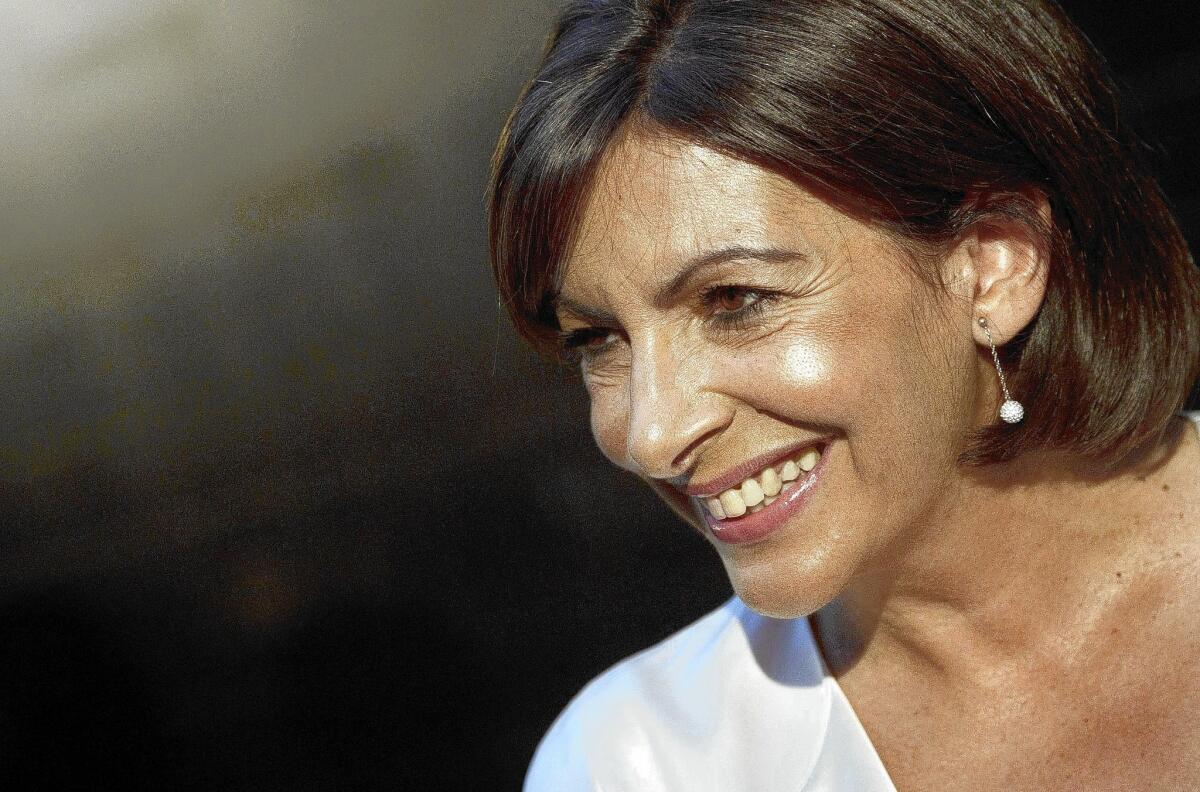‘My absolute priority is housing,’ says Paris’ first female mayor

Reporting from Paris — In March, voters in Paris elected Anne Hidalgo, the daughter of Spanish immigrants, to be their mayor, making her the first woman to hold the prestigious post.
Hidalgo, 55, was born in Andalusia, but became a French citizen as a teenager after her family moved across the Spanish-French border. She is a member of France’s Socialist Party and comes from a long line of left-wing republicans, including her paternal grandfather, Antonio Hidalgo, who fled Franco’s Fascist zone in Spain in 1937 by crossing the Pyrenees with his family on a donkey.
Homesick, Antonio returned two years later, widowed and with four children. He was promptly thrown in jail and given a double death sentence, which was later commuted to life imprisonment.
His children, including Anne’s father, were outcasts in their hometown. The family moved to the French town of Lyon in 1961.
Anne Hidalgo’s parents have since returned to Spain. Her older sister, Marie, manages a company in Los Angeles.
Hidalgo spoke to The Times recently in her office overlooking the Seine.
Does it make a difference having a female mayor?
Paris was ready to have a woman mayor because it is a progressive city that likes to invent and innovate. It’s a mental progression that Parisians have made perhaps in advance of the country as a whole.... I have the impression that the Parisians I meet are happy to have a woman mayor and proud to live in a city where this happened.
Your father and mother came to France as immigrants from Spain when you and your older sister were children and you lived in a housing project. You have said this has given you a unique insight and approach to city problems. How?
I grew up on a working-class housing estate. It had a bad reputation, which it deserved. The flats were run-down and there were no bathrooms or elevators, but it was a happy Tower of Babel. The neighbors were Armenian, Spanish, Portuguese, Italian, Russian, North African. French was the common language that united us. The flats on the estates were like rabbit cages that you just wanted to escape from. It taught me a valuable lesson in town planning and social housing.
There are very rich and very poor areas of Paris. How do you intend to address the inequalities?
There is a worrying lack of housing at a price that is affordable. I will continue building social homes and even secure private funding to create housing at prices people can afford. This was a campaign promise and I have made it my objective.... The social mix comes through housing. It’s the beginning and end of equality.
You took French nationality when you were 14. Do you now feel Spanish or French?
I feel European. I grew up in France, but at home we spoke Spanish to our parents and were raised with Spanish culture, dance, literature, music, all of which I treasure. I go back to Spain often.... The mix of these two can only be positive because the influences bring something new. My success is a little bit like a French version of the American dream. I think of France as a country that has allowed me to integrate, and this is an example for the world. This is the French republican model.
What is the global attraction of Paris? Positives and negatives?
Paris is a historic city with a great heritage. Having said that, the beauty of yesterday should not stop us developing the beauty of tomorrow. It’s a sensitive subject, but there has to be a balance between history and the future, especially when it comes to architecture. Paris has to move forward; it cannot be a museum.
What are your priorities for Paris?
My absolute priority is housing, without which all the wonderful opportunities that Paris has to offer its residents means nothing. I’m also determined to use the city’s capacity for innovation to become more ecological. And lastly, we need to have solidarity with the most vulnerable residents of our city, which in my opinion is the only way we will make any progress.
You went to New York and immediately hit it off with Bill de Blasio. Your sister lives in California. Do you have a special relationship with the United States? What can Paris learn from New York and Los Angeles?
My meeting with the mayor of New York was particularly rich and constructive. Our two leading cities are facing the same problems and have to rise to the same challenges. We are doing so in our own ways, but we have an enormous amount to learn from one another, not just in terms of innovation, but also in wide and various fields, including ecology, transport and even education. If the world’s major cities confront the challenges we all face together, we will send a vital signal to our governments of the way forward.
Willsher is a special correspondent.
More to Read
Sign up for Essential California
The most important California stories and recommendations in your inbox every morning.
You may occasionally receive promotional content from the Los Angeles Times.










